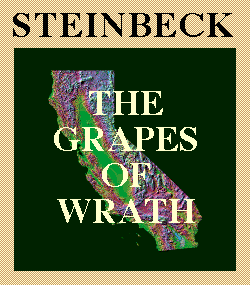
| Printing History |
|---|
| First
published in the United States of America by the Viking Penguin, Inc., 1939 First published in Penguin Books 1976 Copyright John Steinbeck, 1939 Copyright renewed John Steinbeck, 1967 |
| Main Characters | ||
|---|---|---|
| 2 | truck driver | OKLAHOMA CITY TRANSPORT |
| waitress | truck stop near Shawnee | |
| Tom "Tommy" Joad | paroled prisoner, Tom Joad's son | |
| 4 | Jim Casy | onetime preacher |
| 5 | Joe Davis' boy | a tractor driver |
| 6 | Milly Jacobs | Joad neighbor |
| Albert Rance | Joad neighbor | |
| Muley Graves | neighbor, stays behind when others leave | |
| Peters | Joad neighbors | |
| Herb Turnbull | the man Tom killed | |
| Old Man Turnbull | his father, promised to get Tom when he's released | |
| Willy Feeley | tractor driver, deputy sheriff | |
| 8 | Elsie Graves | neighbor who teased Willy |
| Old Tom Joad | Tom's father | |
| Ma Joad | Tom's mother, nee Hazlett | |
| Al Joad | Tom's 16-year-old brother | |
| Granpa Joad | Tom's grandfather | |
| Granma Joad | Tom's grandmother | |
| Noah | the Joad's firstborn, Tom's brother | |
| Uncle John | Tom's 50-year-old uncle; Old Tom's brother | |
| Rosasharn | Rose of Sharon, Tom's pregnant sister | |
| Connie Rivers | Rosasharn's 19-year-old husband | |
| Ruthie | Tom's 12-year-old sister | |
| Winfield | Tom's 10-year-old brother | |
| 13 | fat man | suspicious gas station attendant |
| Ivy Wilson | Kansas camper near Bethany, from Galena KS | |
| Sairy Wilson | his ailing, skeletal wife | |
| 15 | Mae | truck stop waitress |
| Al | truck stop cook | |
| Big Bill the Rat | truck driver | |
| 16 | one-eyed man | junkyard attendant |
| campsite proprietor | won't let Tom join his family | |
| ragged campsite man | been to California already | |
| 18 | father and son | returning from California |
| Jehovite woman | says Granma's gonna join Jesus | |
| deputy sheriff | runs Okies out of Needles camp | |
| boy | plays muskrat in river with Tom | |
| boy in white | Needles gas station attendant | |
| another boy | his helper | |
| inspector | agricultural check near Daggett | |
| 20 | Hooverville mayor | bull-simple guy in Hooverville |
| grey-haired woman | Hooverville mayor's wife | |
| Floyd Knowles | young valve grinder in Hooverville | |
| labor contractor | from Tulare County | |
| Joe (Mike?) | deputy sheriff with the contractor | |
| proprietor | Hooverville store owner | |
| watchman | gate guard at Weedpatch government camp | |
| woman nursing | camp neighbor; makes breakfast | |
| Wilkie Wallace | her husband? | |
| Timothy Wallace | Wilkie's father | |
| Mr. Thomas | small farm owner | |
| Jim Rawley | camp manager | |
| Lisbeth Shandry | Christian woman | |
| Jessie Bullitt | Ladies Committee chair | |
| Annie Littlefield | Ladies Committee | |
| Ella Summers | Ladies Committee | |
| Mrs. Joyce | mother of five girls with the skitters | |
| Amy | a pig-tailed girl | |
| 24 | Ezra Huston | Central Committee Chairman |
| Jeremy | dark young man from Unit Two | |
| Willie Eaton | entertainment chairman | |
| Black Hat | makes twenty-five cents an hour | |
| Jule Vitela | half Cherokee dance guard | |
| 26 | tiny bald man | Hooper Ranch storekeeper |
| unnamed folks | guards and strikers | |
| George | scum who kills Casy with a club | |
| 28 | Agnes Wainwright | shares the boxcar with the Joads |
| Tobin Wainwright | her husband | |
| Aggie Wainwright | their daughter, Al's friend | |
| Hawleys | Will, Benton, Amelia, Claire - pickers | |
| Carpenters | six pickers | |
| Humes | James, Ralph - pickers | |
| 30 | starving man | about fifty, in the barn |
| boy | his son | |
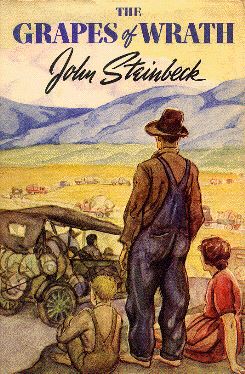
Dustjacket from the First Edition
source
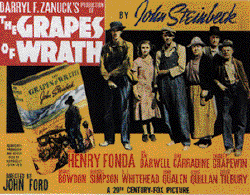
Movie Poster (1940)
source
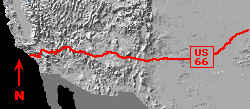 "66 is the mother road, the road of flight."
"66 is the mother road, the road of flight."
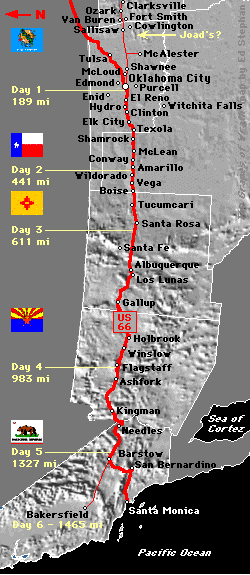 places mentioned in Chapter 12 of
places mentioned in Chapter 12 of
The Grapes of Wrath
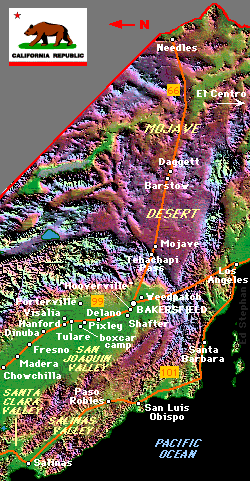 the setting for Chapters 18-30 of
the setting for Chapters 18-30 ofThe Grapes of Wrath
| Ecclesiastes 4 | |
|---|---|
| 9 | Two are better than one; because they have a good reward for their labour. |
| 10 | For if they fall, the one will lift up his fellow: but woe to him that is alone when he falleth; for he hath not another to help him up. |
| 11 | Again, if two lie together, then they have heat: but how can one be warm alone? |
| 12 | And if one prevail against him, two shall withstand him; and a threefold cord is not quickly broken. |
| Notes and Links |
|---|
| Revelation 14:19 — The angel swung his sickle on the earth, gathered its grapes and threw them into the great winepress of God's wrath. |
|
Note: Day 3 is Saturday (page 215, Tom: Sunday tomorrow; Albuquerque closed) |
|
Note: the year seems to be 1938 (page 222, Tom says the '25 Dodge is 13 years old) |
|
Migrant Labor Camp Photographs, 1935-6 5 sets, mostly Arvin Camp in Kern County |
| Amazon Books: The Grapes of Wrath |
| AltaVista Search: Steinbeck AND Grapes of Wrath |
|
1940 movie:
Grapes of Wrath starring Henry Fonda, Jane Darwell and John Carradine Tom Dirks' Summary, Posters - outstanding page! |
| Palme d'or: Les raisins de la colere |
| Urban Legends: Angry Raisins Japanese mistranslation? |
| 1991 TV movie |
| Smithsonian's Dustbowl Storm video |
| great site: Route 66 - detailed maps, photos, links |
| California Historical Route 66 Association |
| Jerry Stanley's Children of the Dustbowl |
| Excellent website: Weedpatch Camp |
|
Woody Guthrie Talking Dustbowl Blues I Ain't Got No Home In This World Anymore DO RE MI Highway 66 Blues Pastures of Plenty Pretty Boy Floyd Tom Joad |
| Arlonet's Guthrie Center |
| Route 66 Visitors Center |
|
OKLAHOMA Elk City McAlester Oklahoma City, OK Shawnee TEXAS Amarillo NEW MEXICO Albuquerque Gallup ARIZONA Flagstaff Kingman CALIFORNIA Bakersfield Barstow || Barstow Mojave, CA Needles Tehachapi Tulare |
| Book Blurb — Penguin 1976 |
|---|
|
THE EPIC STORY OF THE JOAD FAMILY'S MIGRATION FROM THE OKLAHOMA DUST BOWL TO THE PROMISED LAND OF CALIFORNIA |
| In stark and moving detail, John Steinbeck
depicts the lives of ordinary people striving to preserve their humanity in the
face of social and economic desperation. When the Joads lose their tenant farm in
Oklahoma, they join thousands of others, traveling the narrow concrete highways
toward California and the dream of a piece of land to call their own. Each night
on the road, they and their fellow migrants recreate society: leaders are chosen,
unspoken codes of privacy and generosity evolve, and lust, violence, and
murderous rage erupt. A portrait of the bitter conflict between the powerful and the powerless, of one man's fierce reaction to injustice, and of a woman's quiet, stoical strength, The Grapes of Wrath is a landmark of American literature, one that captures the horrors of the Great Depression as it probes into the very nature of equality and justice in America. |
| Chapter Summary | |
|---|---|
| 1 | A description of the dust bowl. "The men were silent and they did not move often. And the women came out of the houses to stand beside their men—to feel whether this time the men would break." |
| 2 | Tom Joad gets a lift at a truck stop and tells the driver he's paroled from prison in McAlester (for murder) and he's headed home. "But sometimes a guy'll be a good guy even if some rich bastard makes him carry a [No Riders] sticker." |
| 3 | A turtle's endless struggle to go southwest. Up on the highway, missed by a car, hit by a truck. His struggle plants an oat head he picked up earlier. |
| 4 | Tom picks up the turtle. He spots Jim Casy sitting by a tree singing "Yes, sir, that's my Saviour" who condemns himself for laying with girls he'd earlier filled with Holy Spirit ("the sperit ain't in me no more"). The turtle keeps trying to escape Tom's jacket. Casy explains his beliefs. Tom tells how you get comfortable with jail. He tells Jim Pa "always said you got too long a pecker for preacher." They talk of how Uncle John tried to eat a whole shoat. At the Joad place: "They ain't nobody there." |
| 5 | How the bank agents tell the tenants to leave the land. How the tractors rape the land. How the tractor driver knocks the tenant farmer's house off its foundation. |
| 6 | The gate is unhung (set to keep in pigs like the one that got away and ate the Jacobs' baby). Tom notices that nothing's stolen the way it was when Albert Rance took his family to Oklahoma City for Christmas; so everyone must be gone. The turtle continues southwest. Muley tells Tom his family's at Uncle John's. Tom explains the murder of Herb Turnbull. They cook Muley's rabbits on an open fire. Tom says prison makes no sense. Casy gets the sperit: he's gonna hit the road. Muley shows them how to hide from deputy Willy Feeley. They sleep in the open. |
| 7 | All about used car lots: "Goin' to California? Here's jus' what you need. Looks shot, but they's thousan's of miles in her." |
| 8 | Tom and Casy head for Uncle John's place. John's wife died of "appendick." Tom's joke about Elsie Graves teasing Willy pleases Casy. They sneak up on Pa who's fixing a Hudson Sedan converted to a truck. They surprise Ma cooking breakfast; "Come right in mister"; her fork clatters to the floor. Grampa and Granma sleep in the barn (easier night trips). Grampa can't button his fly. Granma repeats "Pu-raise Gawd for vittory." How Pa botched Noah's delivery. The preacher says a grace ("mankin' was holy when it was one thing"). Rosasharn's got married and pregnant. Al's out a-billygoatin'. |
| 9 | Disposing of everything. Sell it. Pack it, leave it or burn it. |
| 10 | Al takes a truck of junk to Sallisaw. Ma worries about California being too good. Tom tells her to "jus' take ever' day." The preacher asks to go along. The truck returns. Uncle John's appetites now restrained. The truck is Al's responsibility. They got eighteen dollars for every moveable thing on the farm. At the conference Pa says they have a hundred fifty-four. Al assesses the truck. Pa figgers close and asks Ma if they can take the preacher. "It ain't kin we? It's will we?" Two pigs are slaughtered and they decide to go next morning. Ma burns her stationery box. Muley drops by but won't go. Grampa won't either, but they use Ma's soothin' sirup. They leave Muley two dogs and the chickens. Ma wants to look back but can't. |
| 11 | When a horse quits work there's life yet; when a tractor's turned off its cold dead. Cats go wild, and bats and weeds take over deserted farmland. |
| 12 | "Highway 66 is the main migrant road. 66—the long concrete path across the country, waving gently up and down on the map, from the Mississippi to Bakersfield—over the red lands and the gray lands, twisting up into the mountains, crossing the Divide and down into the bright and terrible desert, and across the desert to the mountains again, and into the rich California valleys." |
| 13 | Al drives to the highway at Sallislaw and heads west. Ma thinks there may be mountains before California, but "Up ahead they's a thousan' lives we might live, but when it comes, it'll on'y be one." Near Paden a gas station man is surly till he learns they'll pay, asks "What's the country coming to?", and Tom tells him "you don't want to know." They all drink water. The dog gets run over. Granma naps in the restroom. Tom drives through Oklahoma City. Ma worries about his crossing the state line on parole. At Bethany they camp near the Wilsons' touring car. Granpa has a stroke and dies with Casy saying the Lords Prayer and Granma shouting. He's buried in the Wilsons' quilt with Psalms 32:1 written out. They hear of the Wilsons' hard times. Pa shows them a handbill that says PEA PICKERS WANTED IN CALIFORNIA. GOOD WAGES ALL SEASON. 800 PICKERS WANTED. Tom suggests they share the ride with the Wilsons. Ma: "Each'll help each, an' we'll all git to California." |
| 14 | "The Western States, nervous as horses before a thunderstorm." ... If from "I have a little food" plus "I have none" the sum is "We have a little food", the thing is on its way, the movement has direction. ... "This is the thing to bomb." Paine, Marx, Jefferson, Lenin were results, not causes. |
| 15 | The truck stop hamburger stand. Fat man and his wife on the way to Beverly-Wilshire Hotel and the Pacific Ocean stop by ("shitheels"). Then two truckers. Family gets a 15-cent loaf of bread for 10 cents and nickel-a-piece candy two-for-a-penny. The truckers leave two half dollars for two ten-cents cups of Java. Mae: "Truck drivers ... an' after them shitheels." |
| 16 | Across the panhandle, stop overnight west of Amarillo, and into New Mexico. Rosasharn says she and Connie plan to live in town. He'll learn radio. Burned out con-rod bearing. Tom suggests he and Casy stay behind. Ma grabs a jack handle to fight Pa with: "I ain't a-gonna go." The truck goes on to find a campsite. Tom works on the car, cuts his hand, covers it with piss-mud. Casy philosophizes about mass movement. Al arrives and says Granma's gone nuts. Back in Santa Rosa a one-eyed junkyard man who hates his boss helps Al and Tom get the part they need. Tom tells him about a one-legged whore, and that he oughta cover up his eye ("tell 'em ya dong's growd"). They return to Casy and fix the Dodge with a flashlight from the man. The campsite owner won't let them stay. A ragged man who's been to California and is going home to starve tells them all about labor contractors and about how his wife and two kids died out there. As Tom, Casy and Uncle John go back to the Dodge Tom throws a clod that busts the proprietor's kerosene lamp. |
| 17 | "In the daylight they scuttled like bugs to the westward; and as the dark caught them, they clustered like bugs near to shelter and to water." The structure and function of the moving campsite society. |
| 18 | They drive through the rest of New Mexico and Arizona (driving all night) and arrive at the Colorado River by dawn. At Needles the men take off their clothes and bathe in the river, joined by a father and son who're going back to the panhandle. He tells how the land is already owned and not worked, how sheriffs push you around, and people call you Okie. How a newspaperman with a million acres is afraid of dying. In the shade Noah tells Tom he's going downriver to stay. A Jehovite wants to hold a meeting in Granma's tent, to see her on her way to Jesus, but Ma says no. A sheriff tells Ma he'll run them out if they're there tomorrow; she runs him off with an iron pan. Wilson announces they're not going on (Sairy's deathly ill). Around four the Joads start. The Needles gas station attendant tells them he wouldn't have the nerve to cross desert in their Jalopy, then tells his helper: "Them goddamn Okies got no sense and no feeling. They ain't human." Around midnight, near Daggett, is the agricultural inspection. Ma say's Granma's real sick so they are allowed to push on. They hit Mojave at dawn. They go through Tehachapi Pass and see the valley. Pa: "I never knowed there was anything like her." Ma: "Thank God! The fambly's here." She tells them Granma died before the inspection stop. They drive on down into the valley. |
| 19 | California goes from Mexicans to American landgrabbers to businessmen. With Chinese, Japanese, Mexican and Filipino slaves the farmers grow fewer and richer. Many have never seen the farms they own. The owners hate Okies; so do the workers. Life in Hoovervilles. "Pray God some day a kid can eat. And the association of owners knew that some day the praying would stop." |
| 20 | Granma's corpse is left with the county in San Bernardino. They camp in a Hooverville across a bridge, where a Floyd Knowles explains the labor gimmicks, the handbills, the blacklist. Casy to Tom: "Almighty God never raised no wages." Casy thinks of leaving, but Tom tells him to stay. Connie tells Rosasharn he'd been better of driving tractor back home. Ma cooks a stew with fifteen hungry kids looking on; she learns about the camp at Weedpatch and the Sat'dy night dance. Al helps Floyd with the valves. A woman scolds Ma for sharing the stew with her kids. Floyd thinks there's work in Santa Clara Valley. Contractor says they need workers in Tulare County; the deputy with him says they're gonna clean out the camp. Floyd slugs the deputy when he tries to arrest him, runs away; the deputy shoots a woman's knuckles off; Tom kicks the deputy unconscious as Floyd runs for the willows. Casy tells Tom to hide. Casy takes the blame and rides off with the deputies. Rosasharn says Connie's gone away. Casy's noble act makes Uncle John get drunk. The family decides to leave before the camp gets burned. Tom goes looking for Uncle John and brings him back after knocking him out. Their truck is stopped by armed men who tell them to go to Tulare; Tom pulls off till they're gone (they burn the camp) and he heads south on 99. |
| 21 | "And money that might have gone for wages went for gas, for guns, for agents and spies, for blacklists, for drilling. On the highways the people moved like ants and searched for work, for food. And the anger began to ferment." |
| 22 | Tom pulls over the speed bump into the government camp and then to Number Four Sanitary Unit. The watchman explains governance: each of five units elects a Central Committee man, and they make the laws. How they allowed preachers but no collections, and no preachers came. All sleep. Tom wakes and finds a girl nursing a baby while cooking on an iron stove [same story as Long Valley's "Breakfast"]. He goes with her men to find work at Mr. Thomas' who informs them the Farmers' Association (Bank of the West) has switched the wage from thirty cents to twenty-five (they also sent the men who burned the camp; and they're going to the dance on Saturday). "A red is any son-of-a-bitch that wants thirty cents an hour when we're paying twenty-five." Ruthie and Winfield discover the toilets, then show them to Ma who is embarrassed to find out she's using the men's and that the Ladies Committee is due. Mr. Rawley visits and has coffee. Pa, John and Al go to look for work. Rosasharn learns how to shower. Ma: "Why, I feel like people again." Mrs. Shandry complains to Rosasharn about hug-dancin' on Sat'dy night and that Rawley's the devil, which he says he isn't. The Ladies Committee arrives and show Ma the Sanitary Unit. They tell Mrs. Joyce to stop stealing toilet paper; to take money and feed her daughters cheese. Ruthie and Winfield play with Amy, but Ruthie is ostracized. The men don't find work; John's not looking well. Ma drives Mrs. Shandry away; while Shandry howls, the manager notes she's not well. Ma tells John to get Pa to buy good stuff for dinner. |
| 23 | Migrant entertainment. Stories (the Indian, naked as the sun; an' bang! an' you spoiled sumpin better'n you). Movies. Getting drunk. Preachers. Harmonicas and guitars and fiddles. Texas boy and Cherokee girl dancing. |
| 24 | The camp prepares for the Saturday dance. The Committee prepares for trouble and plans no violence. Al tries to pick up a blond girl. Tom kids Rosasharn about getting big, then joins Willie's committee. Pa debates Black Hat over becoming a twenty-cent man. Tom and Jule watch visitors arrive. Jule spots three troublemakers, and a kid tells Huston there's two cars with guns. Ma and Rosasharn sit on a bench as the band plays "Chicken Reel." The men capture the three troublemakers and remove them. Deputies can enter without a warrant if there's a riot. They put the three over the fence. Black Hat tells of a turkey shoot in Akron the previous March and how that put an end to being molested. |
| 25 | The beauty of Spring in California. How debt chokes off the crops and the farmers. Everything is destroyed to keep up the price. "And children dying of pellagra must die because a profit cannot be taken from an orange." "In the souls of the people the grapes of wrath are filling and growing heavy, growing heavy for the vintage." |
| 26 | One month in Weedpatch and the Joads are down to a day's worth of grease, two of flour, and ten potatoes. In all there's been five days work for Tom. Ma decides they'll have to leave. Al will miss his blond, Ruthie and Winfield (who's not well) the croquet, and Tom the dances. Going toward cotton in Tulare they have a flat tire. A man from the Hooper Ranch east of Pixley tells them there's work picking peaches at five cents a box. Cops lead them past shouting men. They're told to find House 63. The family picked the rest of the day for a dollar and everybody's tar'd. It takes the whole dollar to buy fat, gristly hamburger, potatoes, bread and coffee. Ma to the storekeeper: "I'm learnin' one thing good ... If you're in trouble or hurt or need—go to poor people. They're the only ones that'll help." Guards complain to each other about government camps spoiling the Okies. Tom goes to see the pickets and runs into Casy who explains they were making two and a half cents and talks about the union struggle. Vigilantes chase them under a bridge. Casy: "You fellas don' know what you're doin'. You're helpin' to starve kids." His skull is crushed with a pick handle. Tom takes the weapon and kills George. They crush his nose but he escapes back to the hut. Next morning Tom tells what happened, plans to leave, but Ma tells him to stay. Winfield gets sick from hunger. At night they put Tom between two mattresses in the truck and all leave the farm, heading for Highway 101. Ma: "Gives ya funny feelin' to be hunted like. I'm gittin' mean." Pa: "Ever'body's gittin' mean.... Down that gov'ment camp we wasn' mean." They go about twenty miles and find a bunch of boxcars and a sign: COTTON PICKERS WANTED. Tom says they should stay in a boxcar and he can hide in culvert in the brush by the creek. |
| 27 | All about cotton picking. "Side-meat tonight, by God! ... Stick out a han' to the little fella, he's wore out. ... The ol' woman'll make some nice biscuits tonight, ef she ain't too tired." |
| 28 | The Joads pick cotton for a month, and every night they have meat, and the boxcar they share with another family is "almost nicer than anything we had 'cept the gov'ment camp." By the time later-arrivers come they're aristocrats. While Ma's cooking dinner, Ruthie brags to a girl that her brother (who's hiding from killing a man) can whip her brother. Ma takes food and seven dollars to Tom's cave in the willows. She wants him to go hundreds of miles away, but he's decided to do what Casy did. He remembers some scripture Casy told him once (Ecclesiastes 4). Tom: "maybe like Casy says, a fella ain't got a soul of his own, but on'y a piece of a big one. ... I'll be ever'where—wherever you look." Returning, Ma runs into a man looking for pickers and says they'll be there in the morning. Mr. Wainwright worries about his grown daughter and Al. Pa thinks about the old place. Ma: "This here's purtier—better lan'." Ma notes that a man lives in a jerk, a woman in flow. Al announces he and Aggie are aiming to get married. The families celebrate with pancakes and syrup. They wake early for the day's picking. There're so many the field's picked clean by eleven. It rains heavily on the way back and Rosasharn gets chilled. Pa, Al and John fetch firewood all afternoon. It rains all night. |
| 29 | Rain. Winter. Floods. No work. No relief. Illness. Mud. Begging. Hunger. Stealing. Sheriffs. No work till spring. No work, no money, no food (unlike horses). "The women watched the men, watched to see whether the break had come at last." "...the break would never come as long as fear could turn to wrath." "Tiny points of grass came through the earth, and in a few days the hills were pale green with the beginning year." |
| 30 | After three days of rain Pa worries the creek may flood if they don't build a bank against it. Rosasharn's baby comes early, so they can't leave. Eighteen men help Pa build a bank. As a scream comes from the boxcar the water rises over the first thrown dirt. They keep working on the levee through the evening and the screaming. A falling tree wrecks the levee and all scramble for the boxcar. Al tries the truck but it's under water. The baby doesn't breathe. As the water rises, Al suggests building a structure in the boxcar to hold things dry. Uncle John is given the task of burying the baby. Instead he lets it float away in the stream: "Go down in the street an' rot an' tell 'em that way." The water rises to six inches above the floor. All but Al, who's staying with Aggie and their stuff, wade up to the highway and Ma spots a barn on a hill. It starts to rain again as they walk. Inside the barn they find a man and a boy. The man is nearly starved, couldn't keep down bread the boy stole the day before. After Ma makes everyone else leave, Rose of Sharon nurses the man. |
| Battle Hymn of the Republic |
|---|
| Julia Ward Howe |
| note: Steinbeck insisted to Covici that all the verses (and music) of the Battle Hymn be printed in the first edition of the book. It was from this hymn that Steinbeck's first wife Carol took the title. He valued its American emphasis and believed it would offset both fascist and communist criticisms or identities (see Benson's biography, p 387). |
|
He is trampling out the vintage where the grapes of wrath are stored, He has loosed the fateful lightening of His terrible swift sword His truth is marching on. Glory! Glory! Hallelujah! Glory! Glory! Hallelujah! Glory! Glory! Hallelujah! His truth is marching on. I have seen Him in the watch-fires of a hundred circling camps They have builded Him an altar in the evening dews and damps l can read His righteous sentence by the dim and flaring lamps His day is marching on. I have read a fiery gospel writ in burnish`d rows of steel, "As ye deal with my contemners, So with you my grace shall deal;" Let the Hero, born of woman, crush the serpent with his heel Since God is marching on. He has sounded forth the trumpet that shall never call retreat He is sifting out the hearts of men before His judgment-seat Oh, be swift, my soul, to answer Him! be jubilant, my feet! Our God is marching on. ln the beauty of the lilies Christ was born across the sea, With a glory in His bosom that transfigures you and me: As He died to make men holy, let us die to make men free, While God is marching on. |
| Stephan | Steinbeck |
|---|